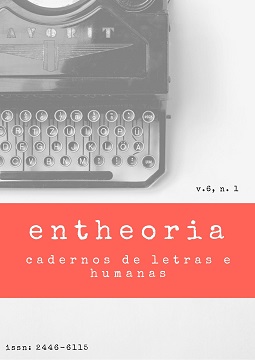UM JOGO POÉTICO NA TRADUÇÃO INTERSEMIÓTICA: QUANDO O CINEMA PENSA
Keywords:
poesia, cinema, intersemioseAbstract
This article problematizes the poetic and conflicting play of some meanings and constructions of memory in the narrative between the novel Lavoura arcaica (1989), by Raduan Nassar, and the film LavourArcaica (2001), by Luiz Fernando Carvalho. In certain of this, let us call, Yohána, father of the narrator-character Andrew, correct to affirm that \"every word, yes, is a seed; among the human things that can haunt us comes the strength of the verb first\" (NASSAR, 1989, p. 162). Thus, in this work, a question is addressed that draws not only the fabric of this solid conflict and, often, tenuous between the visible and invisible, the real and the imaginary, between the text and the screen; above all, it is about the fabric of experiences, the body of material things and also the abstracts that sustain the space of our existence as beings of words and also of images.Downloads
References
BACHELARD, Gaston. A poética do devaneio. Trad. Antonio de Pádua Danesi. São Paulo: Martins Fontes, 1988.
BAKHTIN, Mikhail Mikhailovich. Estética da criação verbal. São Paulo: Martins Fontes, 2003.
BARNES, Jonathan. Filósofos Pré-Socráticos. Trad. Julio Fischer. São Paulo: Martins Fontes, 1997.
BLANCHOT, Maurice. O Livro por vir. Tradução Maria Regina Louro. Lisboa: Relógio D´Água, 1984.
CABRERA, Julio. O cinema pensa: uma introdução à filosofia através dos filmes. Tradução: Ryta Vinagre. Rio de janeiro: Rocco, 2006.
DELEUZE, Gilles. A Imagem-Tempo. Tradução de Eloisa de Araujo Ribeiro. São Paulo. Editora Brasiliense, 1º Ed., 1990.
EISENSTEIN, Sergei. O sentido do filme. Trad. Teresa Ottoni. Rio de Janeiro: Jorge Zahar Editor, 1990.
FOUCAULT, Michel. História da Sexualidade: a vontade de saber. Trad..... V.1. Rio de Janeiro: Graal Ltda, 1988.
HEIDEGGER, Martin. Ser e tempo. Vol. II. Trad. Márcia de Sá Cavalcante. Petrópolis: Vozes, 1996.
KIERKEGAARD, Soren Aabye. O conceito de angústia. Trad. Torriere Guimarães. São Paulo: Hemus, Livraria Editôra Ltda., 1968.
LA BOÉTIE, Etienne. Discurso da servidão voluntária. Trad. Laymert Garcia dos Santos. São Paulo: Editora Brasiliense, 1982.
LEBEL, Jean-Patrick. Cinema e ideologia. Trad. Jorge Nascimento. Lisboa. Editorial Estampa, 1975.
LOTMAN, Yuri. Estética e semiótica do cinema. Trad. Alberto Carneiro. Lisboa. Editorial Estampa, 1978.
NASSAR, Raduan. Lavoura arcaica. São Paulo: Companhia das letras, 1989.
NIETZSCHE, Friedrich Wilhelm. Genealogia da moral: uma polêmica. Trad. Paulo César de Souza. São Paulo: Companhia das Letras, 1998.
ORTEGA Y GASSET, José. ¿Qué es filosofía? Madrid: Revista de Occidente, 1965.
RUIZ, Castor M. M. Bartolomé. Os paradoxos do imaginário. São Leopoldo, RS. Editora Unisinos, 2004.
UNAMUNO, Miguel de. Do sentimento trágico da vida nos homens e nos povos. Trad. de Eduardo Brandão. São Paulo: Martins fontes, 1996.
XAVIER, Ismail. A Experiência do cinema: antologia. Org. XAVIER, Ismail. Rio de Janeiro: Edições Graal: Embrafilmes, 1983.
XAVIER, Ismail. Um Cinema que “Educa” é um Cinema que (nos) Faz Pensar. In: Revista Educação & Realidade: Porto Alegre, 2008.
REFERÊNCIA FILMOGRÁFICA
CARVALHO, Luiz Fernando. LavourArcaica. Brasil: Rio de Janeiro. Rio Filme Distribuidora, 2001. 2h51; cópia em DVD, Versátil, 2006.
Downloads
Published
How to Cite
Issue
Section
License
Copyright (c) 2021 Entheoria: Cadernos de Letras e Humanas ISSN 2446-6115

This work is licensed under a Creative Commons Attribution 4.0 International License.
O(s) Autor (es), na qualidade de titular (es) do direito de autor do ensaio ou artigo submetido à publicação, de acordo com a Lei nº. 9610/98, concorda (m) em ceder os direitos de publicação à Revista Entheoria e autoriza(m) que seja divulgado gratuitamente, sem ressarcimento dos direitos autorais, por meio do Portal de Revistas Eletrônicas da UFRPE e sites associados, para fins de leitura, impressão e/ou download pela Internet, a partir da data da aceitação do artigo pelo Conselho Editorial da Revista. É vedada a submissão integral ou parcial do manuscrito a qualquer outro periódico.


























